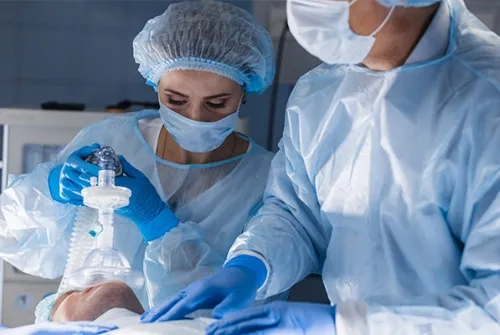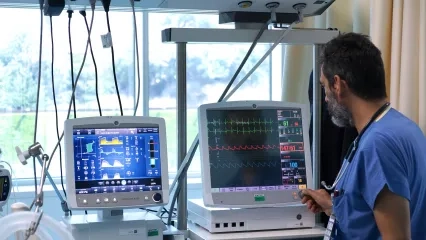Alo Yeditepe
Frontline Warriors in the Pandemic: Anesthesiology and Reanimation Doctors
Referring to the news article titled "Anesthesiologists hailed as special heroes in the fight against coronavirus" by Angela BALDWIN from ABC News, dated April 2020, the article titled "WHO ARE WE?" written by Prof. Dr. Hatice Türe, Anesthesiology and Reanimation specialist at Yeditepe University Hospitals, resonated in the health community.
Spokespersons of Good News
Writing about the common feelings of all Anesthesiology and Reanimation specialists in her article titled "WHO ARE WE?", Prof. Dr. Hatice Türe shared the following:
"We will administer anesthesia to the mother who will deliver her baby by emergency c-section, we will hold her hand to overcome her excitement and fear...
At the door of the intensive care unit, we give you the good news: "Thank God, our patient has opened his eyes"...
You whisper to us, "If I wake up from the surgery, let my mom know I'm okay, and if I don't, let her give me her blessings."
We work for you to have a safe operation, we arrange your medications and serums so that you can recover in intensive care, and we regulate your breathing; hand in hand, we face this difficult time together with you and your loved ones.
We witness the survival of our sibling, our spouse, our child, our parents, or even you. Or we bear the heavy burden that no matter how hard we try, there is nothing we can do.
Our gratuitous labor, your efforts, the prayers of your relatives and all of us... We always want it to end with recovery.
We may not be able to remember those we helped to survive, but we can never forget the pain of the patients we could not afford and those we lost..."
Prof. Dr. Hatice Türe said, "During the coronavirus outbreak, the struggle of Anesthesiology and Reanimation specialists without giving up has once again proved that they are "intensive care specialists". This period should be a milestone."
Uninterrupted Service Day and Night in Intensive Care Units
Prof. Dr. Ömer Kurtipek, President of the Turkish Society of Anesthesiology and Reanimation (TARD), and Prof. Dr. Hatice Türe, member of the Scientific Supreme Board of TARD, shared important information on the COVID-19 pandemic, which has affected the whole world and threatens the human race, representing Anesthesiology and Reanimation specialists, one of the physician groups working on the front line together with physicians in all branches, especially Emergency Medicine, Infectious Diseases, Microbiology, Chest Diseases, Intensive Care specialists. They stated that the names of more than six thousand Anesthesiology and Reanimation specialists, who bear the heavy burden of intensive care units in the field, are not heard enough in this process.
One of the working areas of Anesthesiology and Reanimation specialists is intensive care. Prof. Dr. Hatice Türe, Head of the Department of Anesthesiology and Reanimation at Yeditepe University Koşuyolu Hospital, shared that since the establishment of intensive care units in our country, Anesthesiology and Reanimation specialists have been the branch that mainly works in this field. She expressed her views on the health service they provide uninterruptedly at night as follows:
"All patients who lose consciousness at home or in the hospital for any reason, whose condition worsens, whose heart stops, who have difficulty breathing, who are poisoned, who have had an accident, whose whole body is heavily infected, you hand them over to us in intensive care. We diagnose and treat those patients. We help those who cannot breathe to breathe, follow up and treat them, and try to bring them back to life. We work in cooperation with fellow doctors from other branches, constantly share information and ideas with them, and support each other. At night, as Anesthesiology and Reanimation specialists, we take turns on duty at the hospital. While one group of Anesthesiology and Reanimation specialists work for patients in intensive care until the morning, the other group provides anesthesia for emergency surgeries that last until the morning. These are just a few examples of the work we do. Another important issue that Anesthesiology and Reanimation specialists work on is pain management."
Specialization Requires Intensive Training
Reminding that the majority of the more than six thousand trained doctors in our country are united under the roof of the Turkish Society of Anesthesiology and Reanimation, Prof. Dr. Ömer Kurtipek informed that Anesthesiology and Reanimation specialists work in three areas in hospitals: operating rooms, intensive care units, and pain clinics.
Prof. Dr. Ömer Kurtipek said that an intensive training process is undergone to become an Anesthesiology and Reanimation specialist and shared the following information:
"First of all, you have to finish medical school, which takes 6 years. When you finish medical school, you should take the medical specialty exam, which is the central exam of YÖK (Council of Higher Education), and win the specialty field of Anesthesiology and Reanimation. In this way, you will be entitled to receive training as a medical specialty student in university hospitals or training-research hospitals for 5 years, day and night. During these 5 years, you will learn practical and scientific knowledge in the hospital under the supervision of specialist doctors; you will receive intensive training in 3 sub-headings. In the operating room, you will learn to give anesthesia in all surgeries. You will learn to diagnose and treat patients in intensive care units. In pain clinics, you will learn how to treat patients' persistent pain. At the end of these 5 years, you will prepare your thesis and take the specialty graduation exam. If you pass this exam, you will start your working life as an Anesthesiology and Reanimation specialist by receiving your certificate that you are qualified to manage the clinic. After all these training and exams, believing in the continuity of education, you continue to renew your own knowledge, reading, and learning."
Intensive Care Unit Became a Subspecialty
Drawing attention to a legal amendment regarding intensive care work, Prof. Dr. Ömer Kurtipek gave the following information:
"According to this legal amendment, in order to become an intensive care specialist, after 5 years of specialty training, we are now obliged to receive new training for 3 more years. The number of beds available for adult patients in intensive care units in our country is 24 thousand, and the number of intensive care subspecialists and assistants is 710. The army of six thousand Anesthesiology and Reanimation specialists successfully overcomes most of this work. In addition, most of the 450 intensive care specialists are Anesthesiology and Reanimation physicians."
"We Believe that Our Voice Will Be Heard"
Stating that TIME magazine defined Anesthesiology and Reanimation specialists as "heroes" and carried them on its front cover on April 12, 2020, Prof. Dr. Hatice Türe said, "It became clear once again during the pandemic period that it is not possible to maintain intensive care units in our country without Anesthesiology and Reanimation specialists."
Stating that the Turkish Society of Anesthesiology and Reanimation and its members are working with great effort in the field, Prof. Dr. Ömer Kurtipek said, "As Anesthesiology and Reanimation specialists, we will continue to work and do our duty in the best way for our country, for our people, as always. The struggle we have been waging during the pandemic also shows that it is time for thousands of Anesthesiology and Reanimation specialists working in intensive care units to be given their due. We hope that our voice will be heard on this issue."




